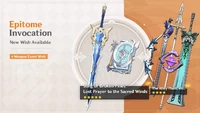Song of Broken Pines is a 5-Star claymore. It is part of the Millennial Movement Series.
Ascensions and Stats[]
| Ascension Phase |
Level | Base ATK |
2nd Stat (Physical DMG Bonus) |
|---|---|---|---|
| 0✦ | 1/20 | 49 | 4.5% |
| 20/20 | 145 | 8.0% | |
| Ascension Cost (0 → 1) | |||
| 1✦ | 20/40 | 176 | 8.0% |
| 40/40 | 286 | 11.6% | |
| Ascension Cost (1 → 2) | |||
| 2✦ | 40/50 | 317 | 11.6% |
| 50/50 | 374 | 13.4% | |
| Ascension Cost (2 → 3) | |||
| 3✦ | 50/60 | 406 | 13.4% |
| 60/60 | 464 | 15.2% | |
| Ascension Cost (3 → 4) | |||
| 4✦ | 60/70 | 495 | 15.2% |
| 70/70 | 555 | 17% | |
| Ascension Cost (4 → 5) | |||
| 5✦ | 70/80 | 586 | 17% |
| 80/80 | 648 | 18.9% | |
| Ascension Cost (5 → 6) | |||
| 6✦ | 80/90 | 679 | 18.9% |
| 90/90 | 741 | 20.7% | |
Total Cost (0 → 6)
 225,000 Mora
225,000 Mora 23 Heavy Horn
23 Heavy Horn 15 Damaged Mask
15 Damaged Mask 23 Stained Mask
23 Stained Mask 27 Ominous Mask
27 Ominous MaskDescription[]
There was once a popular folk song that went like this:
"Toss to the bard all the coins you can spare,"
"Give your bouquet to yon maiden so fair,"
"Take wine so bitter it makes the tears flow,"
"Drink to the yesterday now been and gone, and sing for tomorrow that comes with the dawn."
In the land where songs and music carry on the wind, the people have merry yet sensitive souls.
It is said that there were times in history when the tyrant Decarabian and the ruling aristocrats would ban certain chords and tunes,
For discerning people could sense the spirit of resistance that lay behind the music of the bards and singers.
Songs and hymns had also indeed been used before as a way for rebels to communicate.
In the days of the ruling aristocracy, the Church that revered the Anemo Archon was once split in twain by a schism:
On one side stood the clergy, who ate at the lords' table, and overturned the archon's statues with them even as they wrote songs and hymns of praise.
On the other stood the saints, who held no clerical office, and who walked the streets, the wine cellars, and the world beyond the walls.
These saints drank cheap moonshine, blessing the slave and the plebeian with the original holy manuscripts that circulated amongst the people and with words that the wind brought to them.
And while they did so, they penned forbidden songs and poetry.
When the gladiator from a foreign land arose together with the re-awakened Anemo Archon and raised the banner of rebellion,
The aged saint known as the Nameless Shepherd mobilized the true adherents of the Church of Favonius.
Together with many others, they spilled their martyred blood upon these emerald fields.
And together, they sang a rallying cry to save the nation, the hitherto-unsung half of that folk song of old:
"Leave the keen steel to those who will give their lives for the fight,"
"Prepare the thieves' gallows,"
"Sharpen your rusted arrows,"
"For when the music sounds, we shoot the beasts down."
Preview[]
Gallery[]
Availability[]
Weapon Event Wishes[]
Song of Broken Pines has been promoted or featured with a drop-rate boost in 3 Event Wishes:
| Wish | Featured | Duration | Version |
|---|---|---|---|
 Epitome Invocation 2021-05-18 |
May 18, 2021 – June 8, 2021 | 1.5 | |
 Epitome Invocation 2021-11-24 |
November 24, 2021 – December 14, 2021 | 2.3 | |
 Epitome Invocation 2023-07-05 |
July 5, 2023 – July 25, 2023 | 3.8 |
Chronicled Wishes[]
Song of Broken Pines has been included in 1 Chronicled Wish:
| Wish | Designated Item | Duration | Version |
|---|---|---|---|
 Ode to the Dawn Breeze 2024-03-13 |
March 13, 2024 – April 2, 2024 | 4.5 |
Trivia[]
- The Chinese name means "when the pine-sound echoes," and is referenced in the last line of the lore text: "For when the music sounds, we shoot the beasts down." (Chinese: 留到松籁响起之时,将那衣冠禽兽射落 "Wait until the time when the pine-sound echoes, then shoot those dressed-up beasts down.")
- The pine-sound (Chinese: 松籁 sōnglài) refers to the sound of the wind blowing through pine trees. Traditionally it connotes pure, clear, and beautiful sounds like divine songs.[1]
- Since Mondstadt is full of pine trees and its archon is Barbatos, the God of Wind, Music, and Freedom, the East Asian names of the weapon may be an allusion to the time when Barbatos returns to Mondstadt in order to restore the freedom of the city.
- Eula is seen wielding this claymore in her official Character Demo and one of her official emojis.
Other Languages[]
Song of Broken Pines
| Language | Official Name | Literal Meaning |
|---|---|---|
| English | Song of Broken Pines | — |
| Chinese (Simplified) | 松籁响起之时 Sōnglài Xiǎngqǐ zhī Shí | When the Pine-Sound Echoes |
| Chinese (Traditional) | 松籟響起之時 Sōnglài Xiǎngqǐ zhī Shí | |
| Japanese | 松韻の響く頃 Shouin no Hibiku Koro | When the Pine-Tone Echoes |
| Korean | 송뢰가 울릴 무렵 Songroe-ga Ullil Muryeop | When the Pine Wind-Sound Echoes |
| Spanish | Oda de los Pinos | Ode of the Pines |
| French | Ode au chant du vent | Ode to the Song of the Wind |
| Russian | Песнь разбитых сосен Pesn' razbitykh sosen | Song of Broken Pines |
| Thai | Song of Broken Pines | — |
| Vietnamese | Tiếng Gió Trong Rừng Thông | Sound of Wind in the Pine Forest |
| German | Kiefernklang | Pines' Sound |
| Indonesian | Song of Broken Pines | — |
| Portuguese | Canção dos Pinhos | Song of the Pines |
| Turkish | Kırık Çamların Şarkısı | Broken Pines' Song |
| Italian | Canzone silvestre | Woodland Song |
Rebel's Banner-Hymn
| Language | Official Name | Literal Meaning |
|---|---|---|
| English | Rebel's Banner-Hymn | — |
| Chinese (Simplified) | 揭旗的叛逆之歌 Jiēqí de Pàn'nì zhī Gè | |
| Chinese (Traditional) | 揭旗的叛逆之歌 Jiēqí de Pàn'nì zhī Gè | |
| Japanese | 反抗と旗掲げの歌 Hankou to Hata-kakage no Uta | Song of Resistance and Flag-Raising |
| Korean | 깃발을 든 반항의 노래 Gitbareul Deun Banhang-ui Norae | Song of Resistance Lifting the Flag |
| Spanish | Himno rebelde | Rebel Hymn |
| French | Hymne du drapeau rebelle | Hymn of the Rebellious Flag |
| Russian | Гимн мятежников Gimn myatezhnikov | Insurgents' Hymn |
| Thai | Rebel's Banner-Hymn | — |
| Vietnamese | Bài Ca Phản Nghịch | Song of Rebel |
| German | Lied vom Aufstand | Song of the Uprising |
| Indonesian | Rebel's Banner-Hymn | — |
| Portuguese | Música de Rebelião da Bandeira | |
| Turkish | Asi Sancak Marşı | Rebel Banner March |
| Italian | Ode allo stendardo del ribelle |
Change History[]
References[]
- ↑ zdic.net: 全唐诗 卷五百一十二
[]
| ||||||||







































































